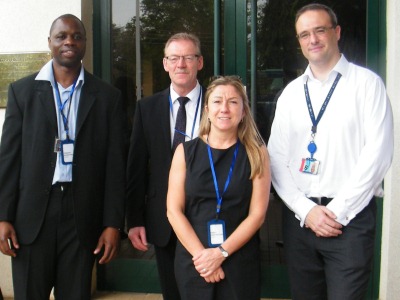
Since the NSPCC set up the Child Trafficking Advice Centre (CTAC) six years ago, the West African region, and Nigeria in particular, has consistently been one of the main source countries we have seen children trafficked from.
Children are usually brought to the UK by plane, often with passports and visas fraudulently obtained by their traffickers, and it’s difficult to identify them once they arrive here at border control. Often they are accompanied by an adult, or in some cases have been given passports falsely stating they’re over 18. This can result in young people who are found by the authorities being prosecuted for immigration offences, rather than being treated as exploited children deserving of a child protection response.
This is one of the reasons we need to work more closely with immigration officials in West Africa. These professionals can intervene to stop a vulnerable young person’s journey, preventing them entering into a dangerous journey and instead stopping them from being trafficked out of their home country.
Tackling trafficking in source countries, stopping the harm before children reach the UK, is also a key part of the UK Government’s Human Trafficking Strategy. The Foreign and Commonwealth Office, along with the NSPCC and National Crime Agency (NCA), agreed funding for a team from CTAC to go to Ghana and Nigeria to deliver training and develop links with colleagues in Africa.
I arrived in Ghana on 1 December with my two colleagues, social worker Terence Shamuyarira and Keith Gibbens, a police officer on secondment from the NCA. We met with professionals and agencies with a role to play in protecting children, to develop links and discuss joint working, and delivered two training sessions.
The first was to visa officials, entry clearance officers and staff from the Risk and Liaison Overseas Network. The second was at the African Children Protection Conference, a forum to develop the UK Visa and Immigration regional strategy on child protection in Africa.
We went on to Nigeria to meet professionals and deliver a training session to visa staff at the British High Commission in Lagos.
I was encouraged by the positive response we received. Many of the 90 staff we trained over the three days said they would use the materials we provided to pass on the learning to colleagues, reaching more than 450 professionals in total.
Participants told us they found the recordings of young people in our participation group talking about their experiences of trafficking useful to put this into context. They spoke about how they were recruited and what they knew about their passports or visas.
We also wanted an insight into the issues that professionals in West Africa face. This allowed us to deepen our understanding of trafficked children’s circumstances, as well as to feed back to policy makers in the UK.
One recommendation from these discussions was for more training, not only for professionals, but also awareness-raising of the dangers of trafficking for vulnerable groups, particularly in rural communities. Children in West Africa often do not have parents or carers and so are easy targets for the traffickers promising them a better life.
Resources to support children who have been trafficked was also raised as an issue. Our discussions highlighted that social services in West Africa are under-resourced in some countries to non-existent in others, with a lack of support for trafficking victims and children under 18 in general.
Victims of trafficking need financial, practical and emotional support, which would usually be provided by social services or non-governmental organisations. Without this support, they are at high risk of being re-trafficked if returned to their communities.
There’s a huge amount of work still to be done, but multi-agency working, both within countries and across borders, is absolutely key to help reduce trafficking.
The closer we work together, the more information we share, the more effective we will be at investigating, preventing and protecting children from trafficking. I feel really positive that the working relationships we developed while in Africa will be part of a lasting legacy allowing us to better protect children.
For more information: The NSPCC’s Child Trafficking Centre provides child protection advice, training, information and support to professionals across the UK concerned about child trafficking.


 A trauma-informed approach to social work: practice tips
A trauma-informed approach to social work: practice tips  Problem gambling: how to recognise the warning signs
Problem gambling: how to recognise the warning signs 




 Find out how to develop your emotional resilience with our free downloadable guide
Find out how to develop your emotional resilience with our free downloadable guide  Develop your social work career with Community Care’s Careers and Training Guide
Develop your social work career with Community Care’s Careers and Training Guide  ‘Dear Sajid Javid: please end the inappropriate detention of autistic people and those with learning disabilities’
‘Dear Sajid Javid: please end the inappropriate detention of autistic people and those with learning disabilities’ Ofsted calls for power to scrutinise children’s home groups
Ofsted calls for power to scrutinise children’s home groups Seven in eight commissioners paying below ‘minimum rate for home care’
Seven in eight commissioners paying below ‘minimum rate for home care’
 Facebook
Facebook X
X LinkedIn
LinkedIn Instagram
Instagram
Really pleased to see NSPCC do such global work.As a lead child protection charity it is important that they look at the anti trafficking work in source countries.Their model of work loosk good, as opposed to Uk ‘ experts’ going to Africa to give words of wisdom.Local knowledge must be valued and incorporated.I hope NSPCC will do more internationla projects in the future.We must undertsand that the children are vulnerable and not immigration offenders.Well done Mandy and team.Very pleased to support such an organisation.